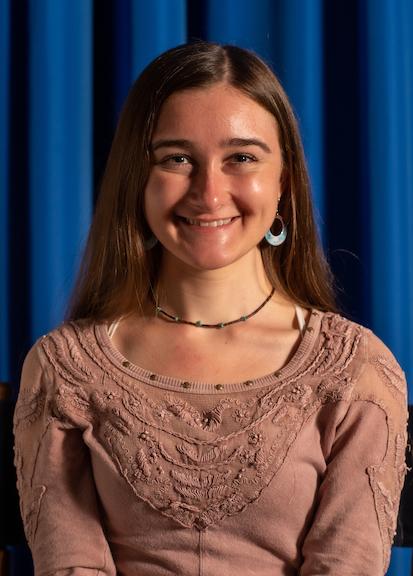Abigail Salmon always knew she would pursue creative outlets for her storytelling instincts, but she knew that wasn’t all she wanted. The Seattle native notes that while she was primarily interested in CSUN for the stellar reputation of its film production program and its centrality to Los Angeles’s entertainment industry core, she was drawn to its broader identity as a comprehensive university where she could explore activities and studies beyond typical art school offerings. After earning an associate’s degree concurrent with her high school diploma in a dual-enrollment program at Washington’s Bellevue College, she arrived at CSUN as a freshman with a healthy head start on college credits and a wealth of potential. She was unsure what creative roles she wanted to take on and saw that uncertainty as liberating. While gearing up to enter the two-year film production cohort, Salmon took English professor Charles Hatfield’s renowned literature course in comic books and graphic novels. Professor Hatfield reignited Salmon’s love for the art form, and more than three years after that experience she continues to work on the comic she submitted as her class final. Having now completed five volumes, she hopes to publish the comic as a series.
Salmon’s visual and narrative expression lean into her love of Neil Gaiman and his abilities to explore difficult themes through fantastic and mythological worlds. Having struggled with her own personal demons, Salmon saw how she, too, could employ fantasy as a vehicle to expose and disarm psychological monsters. The social anxiety and eating disorders that threatened to diminish Salmon as she transitioned from high school to college instead gave her strength when she trained as a student coordinator for Joint Advocates on Disordered Eating (JADE) through CSUN’s University Counseling Services. Salmon credits her intensive work with JADE in building the leadership muscle necessary to commandeer a crew of 45 students when her project Dahlia’s Monsters was selected for development as a thesis film.
Salmon was floored when her senior project film was chosen and credits the mentorship of film professor Nate Thomas and screenwriting professor Jared Rappaport, who each identified potential in her unique voice and encouraged her to follow her instincts. Dahlia’s Monsters follows the title character in adulthood as she battles a literal monster manifested from the trauma of domestic abuse throughout her childhood. The monster’s aggression intensifies as Dahlia takes on significant life changes, and she must find strength to overcome the demon if she is to move forward. In writing the original screenplay Salmon took cues from experiences with peers who had suffered domestic abuse, her mental health advocacy work, and her own psychological hurdles—rendering invisible demons as corporeal beasts through VFX and animation elements. “If I could distance myself from an illness and think of it as a thing that was residing in my brain rather than a part of my identity, it was easier to fight it,” Salmon says.
Even with this writer-director credit on her résumé, Salmon’s not entirely settled on a specific role for herself. Having parlayed an internship at Tricoast Worldwide into an entry-level position at the distribution company’s Dark Matter TV streaming platform, Salmon is set to remain in Los Angeles after graduation to pursue further work in film and television. She’s interested in prop making and set construction, creative development, VFX/animation production—all the facets of media creation that bring imagination to life. Whatever her roles, she envisions herself continuing to explore mental health challenges through fantasy and science fiction. “I love those genres for the amount of creative freedom they grant me,” Salmon says, “and I feel very strongly that sincere, compassionate storytelling about mental health can make a difference in the way we approach it culturally.”







